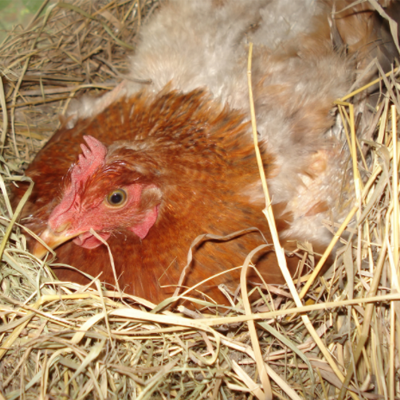How to spot a Broody hen

A broody hen can be a bit of a nuisance if you don’t intend to make them mothers. Broody hens are always super moody!
Hens get broody when they are ready to hatch some eggs themselves. This means that they will lay multiple eggs themselves and then sit on them to incubate them until they hatch. This may all sound cute, but it can get really frustrating.
Spotting a Broody Hen
Spotting a broody hen is quite easy and sometimes you really do have to discourage them. They can become really aggressive every time you try to collect your breakfast and even try to incubate unfertilised eggs, which of course is a futile act.
If you spot the following behaviour in your flock, you may have a broody hen on your hands:
- Scattered breast feathers in the nesting box
If you notice one of your hens are pulling out their breast feathers, you might have a broody hen. Hens pull out their feathers and leave them in the nesting box as insulation for their eggs and upcoming chicks.
- Aggressive behaviour
Broody hens are often quite aggressive and will try to peck you and chase you away from their eggs. If you notice your hen making an absolute ruckus when you try to take her eggs, you might be dealing with a broody hen. They will do absolutely anything to keep their eggs safe from potential threats, which in this case is you.
- Staying in the nest
A broody hen’s instincts are telling her to stay in the nest as much as she can to keep the eggs properly incubated. She will only leave the nest for a very short period of time to eat and go to the toilet.
If you aren’t planning on letting her have babies, then it might be best to put a stop to this behaviour as soon as possible. So what exactly can you do?
What to Do With a Broody Hen
If a hen isn’t hatching fertilised eggs then you should take action on her behaviour immediately. Trying to incubate unfertilised eggs can have a negative effect on her health. Hens tend to put their own needs aside when incubating and will eat and drink drastically less than usual.
You can try these preventative measures to try and discourage a broody hen:
- Collect the eggs
It might be a good idea to collect eggs multiple times a day to make sure there aren’t any eggs laying around to encourage her to incubate.
- Hide the eggs
If you don’t want to collect eggs several times a day, you can try to hang a drape or some kind of cloth in front of the nesting boxes to conceal them. If the hen cannot see the eggs she most likely won’t try to incubate them.
If your hen has already turned into a ball of puffed-up feathers with some anger issues you can try these tips to get her out of it. Remember the longer you ignore it, the longer it will take to get her to stop being mean.
- The caged hen
The cage method entails keeping the broody hen in a wire cage in a well-lit location. How long she stays in there will depend on her behaviour and how long she was allowed to act broody before you took action.
She might have to stay there for only a few days or even a week or more. To check if she’s over her broodiness, simply release her and see if she runs straight back to her eggs. If she doesn’t then you can set her free to go about her business like a normal chicken. Then method has the highest success rate when it comes to fixing broody behaviour.
- The boomerang method
The boomerang method works for some but not others, there is no guarantee. This method entails chasing the hen off of her eggs every time she comes back to incubate them.
For some, this method works and the hen simply gives up on trying. For others, the hen simply waits for you to leave before they run straight back to incubate their eggs again. If you can, try to lock her out of the coop during day time and make sure there are no eggs to incubate when she comes back in the evening.
The take away from this article is that the sooner you catch broodiness, the easier it will be to fix. Broody hens will be completely back to normal after you break the habit. They will even return to being productive egg layers soon after.
To prevent any future problems, make sure you know your chickens and how they normally behave. Knowing your chickens will also allow you to pick up on any health problems early on, so you can take action immediately and save some lives


